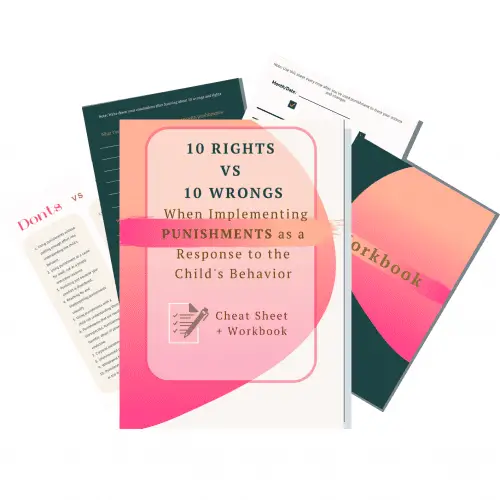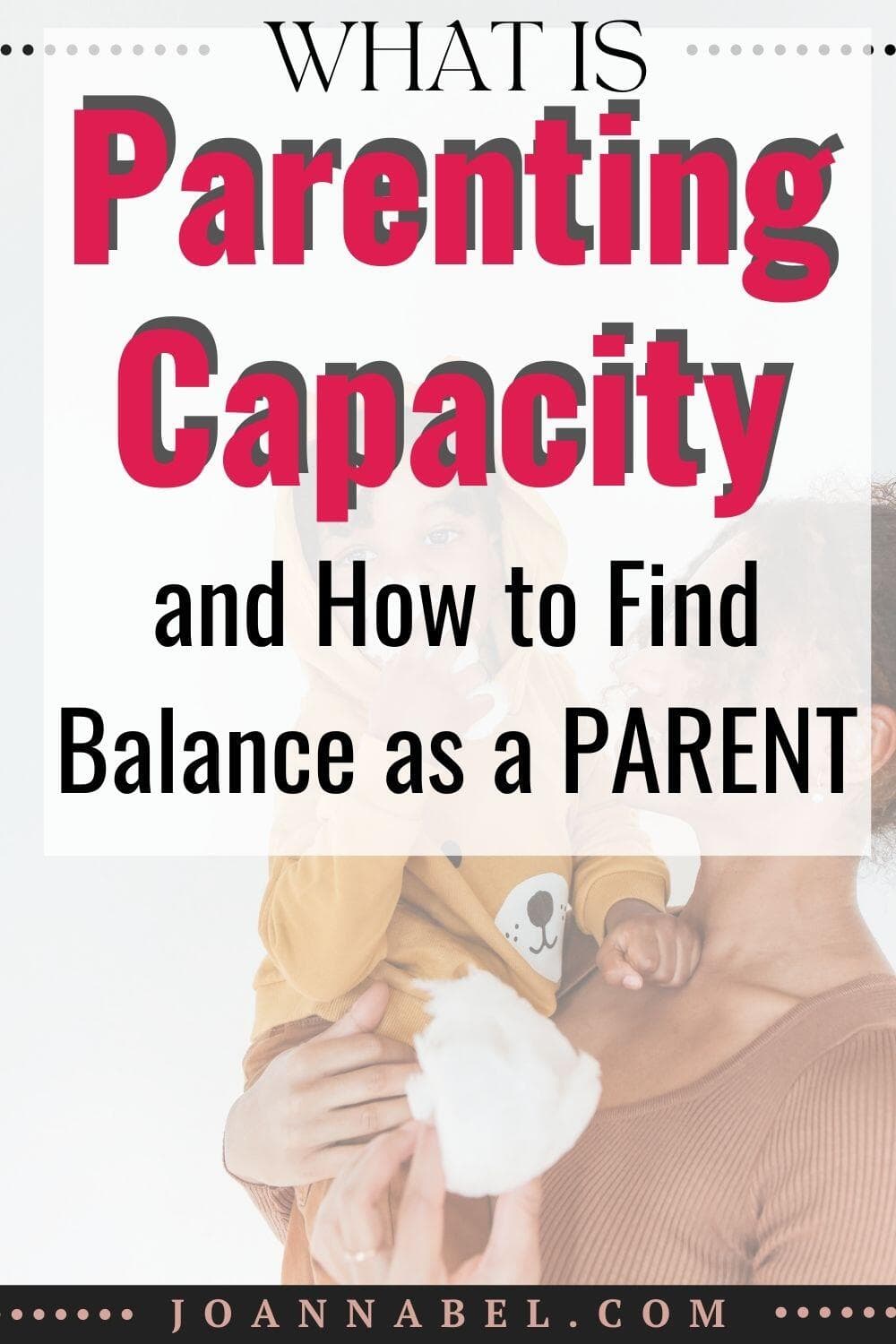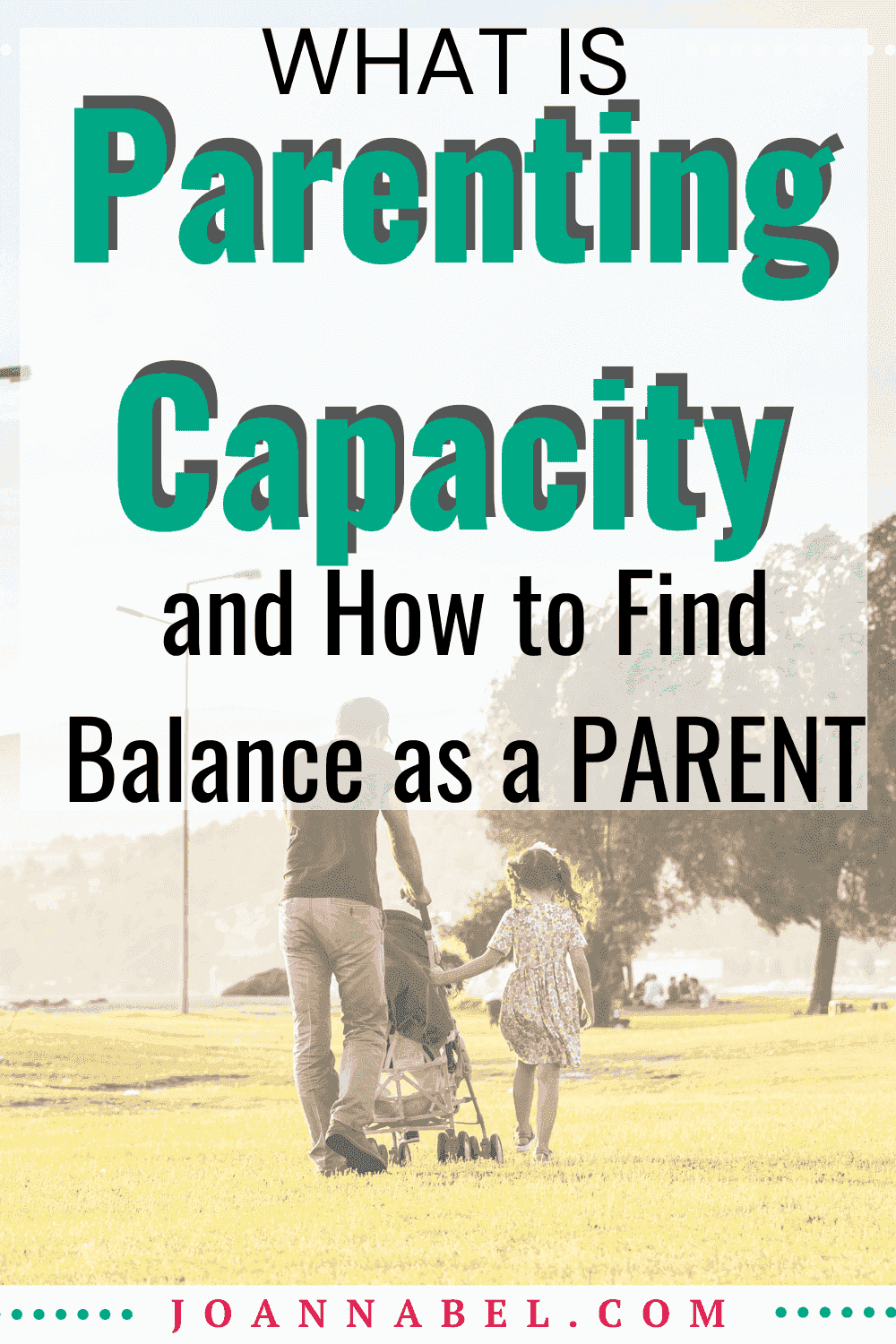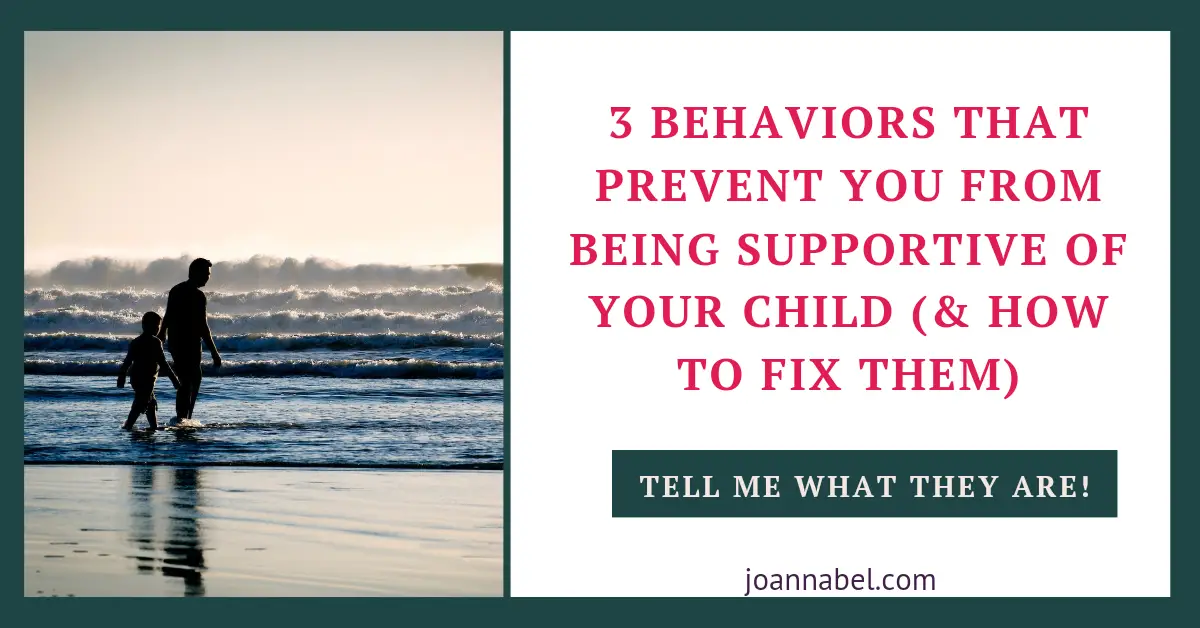As a parent, you often think about the qualities of a good parent or a good enough parent. And especially about strengthening parenting capacity throughout all the challenges that parenting carries.

What Is Parenting Capacity And How To Find Balance As A Parent?
And you probably read a ton of articles on the subject, but you are still uncertain if there’s more to it that’s not covered. Moreover, when you observe yourself as a parent, you’re sure everything isn’t covered. Because there are not that many conversations about parenting capacity.
Or you are in a specific situation or position and those articles don’t mention it.
It seems there’s always more you need to know. And with so many parental challenges and demands out there, who wouldn’t be overwhelmed?!
Therefore, for you to be sure what is ”good’ or ‘good enough”, you need to recognize and understand several dimensions of parenting capacities.
They are:
- Ensuring safety
- Providing basic care
- Emotional responsiveness and warmth
- Stimulation
- Guidance and Boundaries
- Stability.
So feel free to jump to the parenting capacity dimension that interests you the most if you like!
In this post, I’ll walk you through all 6 dimensions one by one, so you can be sure there is nothing left. No doubts or misunderstandings about what’s important.
So, stay with me to find out the most important insights concerning the dimensions of parenting capacity!
Note: Although I am a Clinical Social Worker, engaging with this website does not establish a professional social worker-client relationship. The information provided here is for general purposes only and should not be considered professional advice. While we strive to ensure accuracy and reliability, this content is not a substitute for professional guidance. For specific concerns, issues, or situations, it is essential to consult a qualified professional and present your situation. Read the full Disclaimer here.
WHAT PARENTING CAPACITY IS
Parenting capacity is the parent’s competence and capability to:
- recognize the child’s needs,
- give them priority over their own,
- and respond to them in an empathetic way, in order to provide protection, care, and necessary conditions so a child can grow and develop.
The purpose of assessing parenting capacity is to get closer insights into how well parents can respond to the child’s developmental needs. (I’ll number the needs in another post, so I don’t burden this post.)
For us to be able to understand this, we must ”look into” certain areas or dimensions that can provide intel concerning this. Those areas are the 6 dimensions of parenting capacity, to which this post is dedicated.
They are – ensuring safety, basic care, emotional warmth and responsiveness, guidance and boundaries, stability of the relationships, and stimulation.
The second important thing I want to communicate here is that parenting capacity isn’t a static, inflexible ”thing”, that we can just ”set and forget”.
And that parenting capacity isn’t to be reduced to only some psychological factors of parenting, or the individual skills and capacities of a parent that are fixed or even innate.
You may have gotten this impression due to society’s constant finger-pointing at parents for whatever happens with one family with kids. This is probably due to old outdated concepts (or better-said misconceptions) about individual characteristics being all that matters in one’s life.
These misconceptions are still being pretty strongly imposed. Because then those that use them, don’t, for example, need to do anything about the fact that their position is privileged.
Or acknowledge they have a responsibility to contribute to change. Because they know (or believe) this change will risk their status, which may or may not be true.
What I want you to take out of this is a realization that parenting is going through a continuous process of change and influence that’s depending on the conditions and circumstances a family encounters in the family life cycle.
This means there is a constant exchange within the family, but also between the family and social environment. Family is a part of society and the values and culture of that society are reflected in a family.
The messages you’re getting about parenting are coming from that society. So you should be aware at least, from this moment on, that you should drop the guilt society’s throwing at you.
Especially if this social environment is the opposite of focused on showing support for you as a parent.
WHY SHOULD YOU PAY ATTENTION TO PARENTING CAPACITY?
Now, I want you as a parent to focus on parenting capacity, because you have the most power over this at any given moment. And because what I’ve just explained doesn’t suggest parenting capacity and parenting skills don’t matter.
They’re both important considering parenting is positioned as an assignment (but maybe we can say that it’s also a mission) to accomplish the socialization of kids within:
- family,
- neighborhood,
- local community,
- wider social community,
- cultural environment,
- economic environment,
- and political environment.
Maybe this is the first time you’ve heard this definition of parenting. But I believe this has the power and potential to bring awareness to how important your role as a parent is in one society.
This means that the more critical the role the more responsibility society has to SUPPORT YOU AS A PARENT.

This is why you should shift your perspective that society projected on you from parenting being seen as only the individual (”selfish”) choice – therefore only your responsibility as it’s often wrongly (re)presented!
You as a parent are influencing the future of one society by raising a human that will affect that same society. Potentially by a new invention that will change everyday life.
But we don’t need to go that far even. We can say that by obtaining good parenting capacity you are guaranteeing to this society that your child and future adult will be responsible citizens.
This is why it’s society’s obligation to pay close attention to you as a parent and to support you along the way.
But the other reason why I’m focusing on parenting capacity is that the more empowered you are, the more chance you have to contribute to shifts and changes/movements in your social environment.
People who doubt their parenting capacity or simply their contribution to one society, tend to withdraw themselves (or are being pushed to the side) and don’t ask for what they deserve.
Considering they don’t believe (or are convinced) they don’t deserve it.
I hope this was empowering for you and that it resonates with you. Take a few moments to think about this.
WHAT AFFECTS PARENTING CAPACITY
I’ll mention the circumstances that have the potential to obstruct parenting capacity or parenting competence. Considering they create the most doubt and confusion (and fear, too) in terms of outcomes on the child’s functioning.
So what affects parenting capacity are:
- physical disability
- mental illness of a parent
- intellectual disability
- psychoactive substances abuse
- criminal behavior and lifestyle
- violence between intimate partners (domestic violence)
- parent’s trauma
- socioeconomic conditions
These specific circumstances have the potential to limit parenting capacity. Meaning they can put a child at risk, and even endanger their health or life. BUT that doesn’t mean that simply having them as parts of the family dynamics means we have weakened or limited parenting capacity.

Other defining factors influence these circumstances. Such as – the existence of various issues or challenges besides this one, and the level of social support a family obtains. Then, whether or not a child can depend on other adults, the duration of the issue/problem, and the severity of the issue/problem. And last but not least a child’s resilience.
It’s very important to note that children living in families affected by these circumstances aren’t necessarily at risk of long-term negative outcomes.
This means we should be careful about stereotypical perspectives and prejudices about these families and those kids.
We need to focus on strengths, not on struggles, and observe things from the perspective of strengths.
Or else we’ll contribute to these families facing stigma and even marginalization.
LIVE Q&A And Consultations with Jovana (WISHLIST)
Want a chance to get included in live weekly calls with me and get access to my expert insights, advice, recommendations, and guidance for your unique situation?
Consider signing up if you are aiming for:
- achieving tremendous child-parent relationships with the least effort possible as you learn what to focus your attention to
- attuning to healthy child development practices without losing yourself in the process and ignoring your human needs, rights, and aspirations for your life
- understanding and responding to your and your child’s needs better and carefully easing the tension between the two
- having your most pressing questions and concerns addressed and ongoing support
- getting skilled in honoring the child’s best interest in each life situation with the help of a few key rules and principles (child wellbeing, independence, autonomy, participation, and equality)
- experiencing a supportive and cooperative relationship with the other parent or a co-parent even in high-conflict circumstances
Address your doubts, concerns, and challenges, but also reflect on your situation through the experiences of others in this small and supportive community.
You’ll unlock monthly access for 60% off of my current hourly rate!
6 DIMENSIONS OF PARENTING CAPACITY
I know you have a very challenging job as a parent. I also believe everyone needs to be aware of this before they jump to any conclusions or judgments.
And I’m aware you have many different assignments to do to make sure you provide the necessary conditions for a child to grow, develop, and progress.
These basic requirements need to fit the child’s age, of course. Meaning they have to be adapted to the child´s developing and evolving capacities. For example, it’s not realistic or appropriate to expect a 6-month-old baby to pick up the toys from the floor and arrange them.
So those basic conditions have to match the phase in the child’s development.
Of course, this should never include pressure or demand for the parent to become some ideal prototype of a perfect parent.
Why?
- Firstly, nobody could ever define what is a perfect parent because nobody can fit every child or every situation into one box and because every single child has unique characteristics.
- Children and families live in different social environments, cultures, communities, and conditions.
- At the same time, every parent is different.
- Also, access to important services and support isn´t the same for all parents.
So, instead of trying to standardize every single thing, we should learn to embrace and empower diversity.
And we should always focus on the necessary minimum parents need to provide for the child to thrive.
Instead of trying to seize perfection no matter what or impose personal high criteria on other parents.
Moreover, the criteria for good parenting capacity are not to be defined by our personal values and aspirations, since we all have so many of them.
So, for example, a parent who takes kids to many different activities after school isn’t necessarily a better parent than a parent who isn’t doing those exact things.
What I mean to say is that we shouldn’t confuse good parenting capacity with our personal beliefs, aspirations, and (sometimes too high) criteria.
Actually, what you as a parent need to do is achieve just the required necessary minimum. And I can guarantee your child will be the most fulfilled human alive!
So now, hang on tight, and let’s dive into those dimensions of parenting capacity!
And just a small heads-up for you – these dimensions of parenting capacity aren’t numbered by an order of importance.
1. ENSURING SAFETY
This dimension relates to a parent’s capability to keep a child safe from harm and danger. Both parents are equally responsible for this. Except when there’s an absence of one of them or some other specific circumstance.
A child needs to be safe from harm that can be caused by human behavior – adults and kids. Or can be the result of an unsafe space, object, or situation. But also a parent has to develop a sensibility to predict and prevent dangers while finding a balance regarding protection.
Again, this should be adapted to the children’s age and maturity. Since children become more and more independent in different areas as they grow. And parents need to promote, motivate and strengthen their independence.
But this also implies you should always keep away from overprotecting the children when they become capable of self-protection to a certain degree according to their age.

Quite the contrary, you should make an effort to encourage their independence in a way that is suitable for them. Not for you as a parent.
We need to teach our children to be independent and help them develop skills for protecting themselves when the time is right. I wrote a blog post about helping children to grow their independence. Here is the link to How To Help A Child Become More Independent – 9 Principles To Follow.
We all have to learn how to find a fine balance regarding protection, according to the child’s age, maturity, and capacities.
What I meant to say is that overprotecting the child, when we should instead enforce independence, can be hurtful to the child on many levels.
At the same time, being ignorant when it should be obvious to us that a child needs immediate protection. Especially when it comes to the youngest children, can be the most harmful of all.
This means that if we leave them or keep them in an unsafe room, with unsafe people, or alone when they are too young to stay alone, then it’s obvious, that we’re not protecting them enough. Ad we need to improve parenting capacity.
So it comes to (adaptation based on Bentovim, et al, 2009):
- Safe attachment pattern between the child and the parent,
- Parents finding and keeping a fine balance regarding the protection,
- Parents providing safety at home according to the child’s age,
- Parents protecting the child from dangerous people and preventing their access to the child,
- Parents having direct or indirect control/insights of other places a child is staying.
What is important as well, is to be aware when you as a parent have too much on your plate. Life can sometimes be pretty uncertain and relentless.
Those are complex situations when the child needs some additional support, adjustments, or caution when it comes to providing safety and protection.
They can be, for example, sickness or challenges/disability of a child or other family member, violence, or other hurtful experiences which cause vulnerability, exhaustion, or role intertwining. Of when more people take care of the child, especially if they’re not familiar enough.
I wrote a full detailed blog post that covers ensuring safety as a dimension of parenting capacity. You can find it here: What Is Ensuring Safety As a Dimension Of Parenting Capacity?.
Now let’s move to the next parenting capacity domain.
2. PROVIDING BASIC CARE
The basic care dimension of parenting capacity includes:
- satisfying a child’s physical needs like the need to eat, drink, sleep
- health care
- keeping a child clean enough and in a hygienic, safe, warm enough space
- adequate clothing and footwear
- guided play, walking, etc, all according to the child’s age.

I’ll mention some basic, generally outlined requirements regarding this parenting capacity dimension:
#1 Meals and eating (as well as drink) – for example, parents have learned to recognize when a child is hungry and they respond.
#2 Physical and psychological development – like – parents are conscious of and interested in the child’s physical or psychological state.
#3 Health care – for example, the parent gives or provides the child their prescribed therapy on time if the child is sick or if his/her health condition requires some kind of therapy.
#4 Hygiene – like – the child is bathed and clean enough or changed when needed.
#5 Additional factors – for example, a parent can adapt to the changes in the ways a child’s needs need to be met over time.
For more details concerning these requirements, you can read my blog post dedicated precisely to providing basic care. Here is the link: What Is Providing Basic Care As A Dimension Of Parenting Capacity?.
This doesn’t mean your child needs to have the very best of everything and the most possible quality. Since that’s not always possible and is rarely needed.
Or that you won’t make any mistakes ever. You’re also in a process of learning.
It’s not even advisable to obsess over high standards, because you could teach your children the wrong lesson that they can only feel happy if everything has to be the best of best.
And it’s not about doing things perfectly. And even when you’re having a hard time managing certain aspects of basic care, that doesn’t make you a ‘bad’ parent. That’s not always the parent’s fault.
For instance, sometimes parents aren’t provided with the proper kind of help or they are denied services that should help them, or maybe they’re facing violence and their capacities are weakened.
What’s most important of all is how flexible you are and motivated to change when you need to.
If you want to know more about what requirements this dimension of parenting capacity bears, read my blog post that covers this in much more detail. Here is the link to it: What Is Basic Care As A Parenting Capacity Dimension?.
We can now proceed to our next dimension of parenting capacity.
Related:
If you found the information on the blog helpful & inspirational and you feel like giving back, you can do it by clicking the donate button after entering amount you’re comfortable with. I’ll use it to create and deliver more useful content and resources like this. Thanks for your precious contribution!
3. EMOTIONAL WARMTH AND RESPONSIVENESS
Emotional warmth means securing your child senses they’re being valued, respected, and loved as a person and for who they are, have a positive image of their cultural identity, and that they can rely on stable and supportive relationships with their parents and other important persons in their life that consist of positive affection because they’re responsive to the child’s emotional needs.
This dimension is misunderstood sometimes. Or its importance gets underestimated.
When parents are emotionally warm and responsive then their kids are certain they are loved, cherished, and respected enough as people, as human beings.

Also, this isn’t just related to kids’ parents. Kids need stable and safe relationships with all the other important adults surrounding them. Especially, if they’re the ones who also provide care for the kids, besides parents.
Children need them to be emotionally responsive and warm enough as well. Their grandparents for example.
Here are some guidelines that help children feel you’re emotionally warm and responsive:
#1 Being receptive to the child’s emotional needs and showing you care
#2 Knowing how to self-regulate in managing a child’s mistakes and misbehavior
#3 Being honest with kids
#4 Encouraging freedom, inclusiveness, and participation
If you want to explore these guidelines in more detail, read the blog post that covers the domain of emotional warmth in more detail. Just follow the link: What Is Emotional Warmth As A Parenting Capacity Dimension?.
If you want to put your (or someone else’s) emotional responsiveness and warmth in perspective, you can use the next 4 pointers (indicators; adaptation based on Bentovim, et al, 2009):
1. How much consistency you show in your emotional responsiveness as a result of the recognition of the child’s emotions
2. How you evaluate and then respond to a child’s emotional tone
3. What kind of tone you use in your communication with the child in general and what atmosphere you’re cultivating
4. How supportive and engaged you are while managing to address the tension between independence and dependence in providing this
If you need these indicators more thoroughly explored, read my post that covers this parenting capacity dimension in more detail. It’s called What Is Responsive Parenting + 4 Signs Of Emotional Warmth.
Emotional warmth and responsiveness answers to the child’s need for safe, stable, and persistent connections and relationships with the close and significant adults in their lives, when those adults are responsive and sensible to the child’s emotional need:
- for closeness and emotional warmth
- for connection
- to be seen, acknowledged as worthy, and treated as worthy
- for appreciation and visibility
- to be empowered and encouraged
- to be heard and understood
- to be reassured and comforted
- to feel autonomous and competent
- for having dependable, trustworthy, and reliable adults in their direct social environment
- to feel loved
- to be certain they have a responsible and competent parent
- to feel respected, and worthy in situations when their identity intersects with age and maturity, race, religion, sexuality, disability, etc.
This list isn’t exhaustive, and much more you can find in my blog post that covers emotional warmth more thoroughly. Here is the link to it: What Is Emotional Warmth As A Parenting Capacity Dimension?.
Good enough responsiveness assumes quick, well-timed, consistent, suitable actions and activities directed and targeted to answer the child’s needs.
4. DIMENSION OF PARENTING CAPACITY REFERRED TO AS STIMULATION
You already know what this word represents or means. But in this particular situation and with this dimension of parenting capacity, several words can describe stimulation.
Like:
Assistance, motivation, inspiration, backing, reassuring, comfort and consolation, animation, rewarding, optimism, and even faith.
Think about them.
Do they resonate with you and your situation, when you think of stimulation of your child or children? They’re all part of the process we call stimulating. But what do we stimulate them to do exactly?
Stimulation, as one of several dimensions of parenting capacity, is promoting a child’s intellectual development and learning through cognitively stimulating activities via interpersonal interaction, communication, and inspiring children’s initiatives. Alongside this inspiration of kids’ initiatives, we need to responding to them to enable and boost competence for learning, progress, and success in children.
You want your children to be intelligent, curious, witty. To want and love to learn, to love communication, to be active and hardworking and so much more. But you need to help them do that by stimulating them from the youngest days. And you are doing it even if you aren’t noticing.
When you talk to them while they are just a little cute baby, you are stimulating their cognitive development for example.
So it’s good to be aware of this because they are eating everything you are serving from day one.
Too much pressure? I know, but don’t worry. This can actually be excellent for you.
If you have a good start, it gets easier over time since kids will be more and more independent. Especially if you stimulate them properly.
And they will be, if you balance their need for dependence and independence properly, what we talked about before. They will develop certain habits that will stay with them for the rest of their lives.
So we can divide stimulation into a few categories. But you don’t need to look at them separately because they intersect. They’re all important and one development can include the other.
Now let’s take a closer look at the important stuff in this dimension of parenting capacity:
- Cognitive and intellectual development, supporting, provoking, and boosting,
- Responding to and inspiring the child’s initiatives,
- Problem-solving and facing the challenges, motivation, and assistance,
- Helping discover and reach potentials and opportunities,
- Inspiring and enabling social development, interaction, and activities,
- Promotion, preparation, motivation, and assistance in learning (school).
If you want to know more details about what these 6 elements represent, as well as get more insights concerning stimulation as a dimension of parenting capacity, read my blog post that covers stimulation. Here is the link to it: What Is Stimulation As A Dimension Of Parenting Capacity?.
In a blog post about Stimulation, I’ve also covered situations when a child needs more stimulation than usual.
I hope this was clear. We can now move to our next parenting capacity domain.
5. GUIDANCE AND BOUNDARIES
So Guidance and Boundaries as a parenting capacity dimension is referred to as the way parents teach, assist and facilitate a child to manage their emotions and behavior which they’re doing by:
- regulating and shaping the behavior with a set of limitations and boundaries aimed to get a child to establish an internal model of moral values, develop a conscience, learn socially and culturally acceptable behavior, and
- by directly demonstrating and modeling prosocial behavior, balanced emotional regulation and expression, and socially acceptable and respectful interpersonal interaction.
Guidance and Boundaries can be easiest explained as parents assisting children to regulate their emotions and behavior, so the child can evolve into an autonomous person and a responsible adult.
So, a parent’s job here is to shape and model ”appropriate” behavior and human interaction, so a child can develop prosocial behavior, internalize a sense of morality and conscience, as well as learn how to control and manage its reactions, emotions, and behavior.
This means a child will become:
- competent in quality, prosocial and positive interaction with other people,
- achieve well-balanced independence,
- and will have crystallized prosocial values.
As a result, children will have learned social skills to later use in many different social situations and interpersonal interactions.
Children need you to do this right and you don’t have too much maneuver space for failure, unfortunately. Because we can’t correct some things easily. Or better said, you should better try to prevent them, before trying to repair them later.
Or to respond as soon as possible to the signs of issues.
And this doesn’t just apply to this particular dimension of parenting capacity. A different one can be combined with it, too. Like – difficulties in emotional warmth and responsiveness, basic care providing, or providing safety.
I’m saying this because when it comes to dealing with antisocial behavior, there are many obstacles that are impeding proper rehabilitation and its effects. So remember to try to deal with your child’s behavioral issues sooner than later.
Regardless of this, know that any behavior can change or be unlearned and replaced with a more functional, or prosocial one. However, you might need to consider consulting a professional for guidance and assistance in achieving this.
So how can you tell if you are doing it right? Or how to do it right exactly?
You’ll need to ask and answer some important questions
Try to go through the next several questions. They’re not numbered by order of importance, so feel free to focus on the most important ones for your situation.
And they are usually enough to uncover where you stand concerning this parenting capacity dimension.
#1 How do you steer and regulate a child’s behavior?
#2 How flexible and clear are the boundaries?
#3 How flexible and how clarified are the rules and the expectations?
#4 How do you teach a child to deal with frustration?
#5 Are you modeling the behavior you expect to cultivate in a child?
#6 Do children understand why they’re being punished (if you use punishment) and learn from their mistakes?
#7 Are punishments (if you use them) weighted to the mistakes and appropriate for the child’s age?
#8 Are the disciplinary measures effective and consistent?
#9 Do you use corporal punishment? STOP.
#10 Is the reward system positively structured?
#11 How do you resolve conflicts?
#12 How do you and the other parent sort out different or opposed perspectives regarding guidance?
These questions are explored in detail in my blog post that’s dedicated to parents who need to improve this parenting capacity dimension. Follow this link to Child Guidance: 12 questions for parent self-evaluation.
Regardless, I’ll now mention guidelines that bring positive results when it comes to Guidance and Boundaries.
#1 Balanced attitude around control supported with modeling of the prosocial behavior
#2 Clear and reasonable rules
#3 Consistency in disciplinary measures, cautious and limited use of punishment, and avoidance of corporal punishment
#4 Respectful and equal treatment for kids
I’ve explored these guidelines and much more about this parenting capacity in my post that’s dedicated to Guidance and Boundaries as a dimension of parenting capacity. Here is the link to access it: Guidance And Boundaries As a Parenting Capacity Dimension.
I also have a post that covers the most important terms in relation to guidance, such as discipline, punishment, consistency in disciplinary measures, and setting limitations that you can check out. Here it is – GUIDANCE FROM PARENTS: WHAT IS IT IN CHILD DEVELOPMENT?
A different blog article that I believe you’ll find very helpful, as well, is CHILD BEHAVIOR MANAGEMENT: 12 Signs You’re Crazy Good at it as a Parent, to understand the most important elements of managing child behavior.
As well as the one is the one I already mentioned – Child Guidance: 12 Questions For Parent Self-evaluation, which can be helpful if you’re experiencing problems regarding guidance and boundaries.
You may be interested in checking out also:

PARENTAL GUIDANCE: SELF-EVALUATION GUIDE FOR PARENTS E-BOOK+WORKBOOK
SALE
19 $ 11 $

10 Rights & 10 Wrongs When Implementing Punishments
SALE
14$ 9$
And we’ve reached the last parenting capacity domain we need to explore, so let’s do it.
6. STABILITY
Stability in parenting capacity relates to capability to ensure that family environment is stable enough to support secure attachment with a child’s parent or other caretaker that’s uninterrupted, consistent, and responsive to the child’s need for stable emotional connection and trusting relationship. The need for stability of the relationships expands to other close family members and other people who are considered important in child’s life.
This parenting capacity dimension is something we all can easily relate to. And it’s because every human being seeks it their whole life.
They are never fully at peace if they don’t have it. Whatever else they gain in life.
It’s the certainty of the relationship and the family environment. Where all the important persons we are attached to are available to us and there is continuity of relations.
We need it to be a space of predictability, consistency, and trust. Whatever is happening at particular moments or situations.
And when bad things happen we need this even more.
It should be a space of freedom and clear limitation at the same time.
A place where you’re encouraged to be independent and build your identity and individuality.
With routine and structure but with emotional warmth and connections at the same time. And it should be consistent and predictable for the child in similar situations.
It needs to be a place with clear roles and positions. A parent is a parent, and a child is a child. And they both accept this and stick to it. Yes, it sounds so basic, but it’s not sometimes.
And if parents are separated, the child needs to see and talk to the other parent who now lives apart too. Except there is an OBJECTIVE safety risk of course.
And the child’s important relatives and close people. The intimate partnership of the parents is not to be equated or confused with parenting capacity and parenting skills.
And the same thing applies when the child gets separated from her or his biological family. The need for stability and permanence is even more important.
And when parents face circumstances that impede or prevent the functioning of some of these aspects, they and their children should be provided with support from relevant social institutions or organizations. These conditions can be a consequence of a big social change or disaster. As well as a change or difficulty in family structure or environment.
What you should keep in mind as vitally significant concerning this domain of parenting capacity is (adaptation based on Bentovim, et al, 2009):
#1 Stability and permanence of parenting from the early development phase and throughout the family life duration
#2 Permanence and stability of connections with the most important family members and all the other significant persons
#3 Stability regain and accountability when it comes to periods of change, crisis, or hardships that affect the family
#4 Establishing and building a child’s integrity and identity within the family structure and outside of it, through social responsibility
It’s important to note that in some situations, that affect or change family structure and dynamics, kids need more attention and dedicated efforts to ensure stability.
For example, restructuring of the family such as divorce, loss of a family member, a new family member such as new partners of parents.
You can read more about Stability in my post that covers it in more detail : What Is Stability In Parenting Capacity (Stable Family Environment).
Latest Posts:
- 4 Ways To Get Your Teen Excited for High School

- Simple Safety Measures To Protect Your Family

- The Biggest Benefits Of Adopting A Dog For Your Family (5)

- How To Turn Crafting Into Family Fun Time (6 Ideas)

- Creative Ways To Play With Kids Without Technology

- How To Make Gift-Giving More Special For Kids (4 Ideas)

FINAL THOUGHTS ON PARENTING CAPACITY
First of all, thanks for staying with me.
Secondly, I know parenting is a very tough and demanding job. So I know you’re doing the best you can.
Please, just keep moving forward!
And thirdly, nobody knows how exactly it is to be in your shoes until they see it personally. At least not until they experience how challenging it is to work 24 hours a day 7 days a week.
And it should be enough just to take a look at all those parenting capacity dimensions to understand how hard it is!
However, even if they don’t understand you enough, try to stay brave and positive. What matters the most is your opinion about it.
I’m so grateful I had your attention and hope you enjoyed this post as well as that it helped you. Share your thoughts and experiences in the comments section below! I’d very much like to hear from you!
I look forward to seeing you in the next post! Here’s one: 5 Parenting Style And Rules.











Leave a Reply